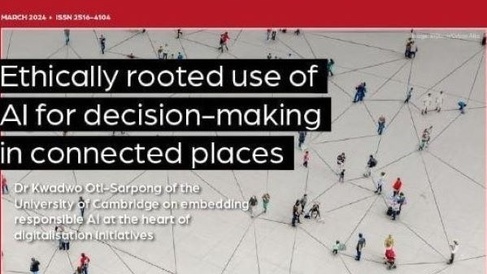
In the cover story of the latest issue of BIM Today, Dr Kwadwo Oti-Sarpong, senior research associate at the University of Cambridge, reflects on the evolving landscape of decision-making with AI in connected places and cities, emphasising the increasing reliance of the public sector on artificial intelligence to address complex societal challenges and advance digitalisation efforts. He argues that the ethical and responsible use of AI in this domain has emerged as a significant concern.
Dr Sarpong explains how in England, some local authorities (LAs) are already employing large language models and predictive analytics to inform decisions at the city scale, aligning with a global trend of leveraging AI for public value creation. Nonetheless, ethical considerations cast a shadow over these endeavours due to worries about algorithmic biases and the potential reinforcement of marginalization and discrimination. The pioneering study launched by a multidisciplinary team of researchers from the University of Cambridge aims at developing an ethically grounded approach to AI use in the public sector to address these concerns. This is part of the University's AI@CAM program which endeavours to embed ethical considerations into decision-making processes surrounding AI adoption in digitalization initiatives.
Led by the Department of Engineering, the project brings together experts from diverse fields such as Land Economy, Architecture, and the Leverhulme Centre for Future Intelligence. Through engagement with city managers and digitalization project partners, the team seeks to grasp the motivations and factors driving the adoption of AI in urban governance.
Dr Oti-Sarpong states that the primary objective of the project is to provide actionable insights and guidance for LAs and their collaborators on ethically informed decision-making concerning AI utilization in large-scale digitalization projects. Through workshops and knowledge-sharing activities, the project aims to empower stakeholders to navigate the complexities of AI adoption while upholding ethical standards. As the project advances, there is a call for collaboration from stakeholders involved in local government and digitalization initiatives related to placemaking, land use, mobility, and sustainable water supply systems. By pooling resources and expertise, stakeholders can influence the trajectory of AI utilization in public sector decision-making and ensure that ethical considerations remain central to innovation.
Read the full article here
